“Kafka could never have written as he did had he lived in a house. His writing is that of someone whose whole life was spent in apartments, with lifts, stairwells, muffled voices behind closed doors, and sounds through walls. Put him in a nice detached villa and he’d never have written a word.”
Alan Bennett, Writing Home
Archives for September 2011
TT: Almanac
“I have no doubt that in heaven the angels will regard the blessed as a necessary evil.”
Alan Bennett, Writing Home
TT: A study of reading habits
The Little Professor posted this meme, and I thought I’d play along:
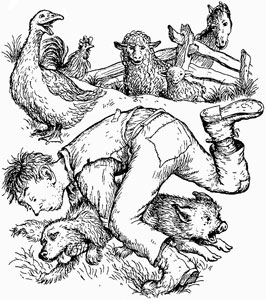 1. Favorite childhood book?
Charlotte’s Web (and I still love it).
1. Favorite childhood book?
Charlotte’s Web (and I still love it).
2. What are you reading right now? David E. Kyvig’s Daily Life in the United States, 1920-1940.
3. What books do you have on request at the library? I gave up using libraries years ago. It’s far easier and quicker to order a used book from Amazon than it is for me to visit any of Manhattan’s public libraries. If I lived elsewhere, though, I’d probably do things differently.
4. Bad book habit? I’m a compulsive dog-earer.
5. What do you currently have checked out at the library? See #3.
6. Do you have an e-reader? No–I ought to buy one, but simply haven’t gotten around to it.
7. Do you prefer to read one book at a time, or several at once? It’s rarely a matter of preference. Because of the nature of my work, I tend to be reading two or three books at any given time.
8. Have your reading habits changed since starting a blog? No.
9. Least favorite book you read this year (so far)? I stop reading a book as soon as I’m sure that I don’t like it–life’s too short to finish reading a bad book–so I don’t have a good answer to this question. I’m about to review a biography that I disliked, but I can’t say what it is until the piece appears.
10. Favorite book you’ve read this year? John Williams’ Stoner, with Wesley Stace’s Charles Jessold, Considered as a Murderer running it a close second. (Both of these books, incidentally, were suggested to me by the same person.)
11. How often do you read out of your comfort zone? I don’t think I have a “comfort zone.” I read whatever interests me, and my tastes wander in all directions.
12. What is your reading comfort zone? See above.
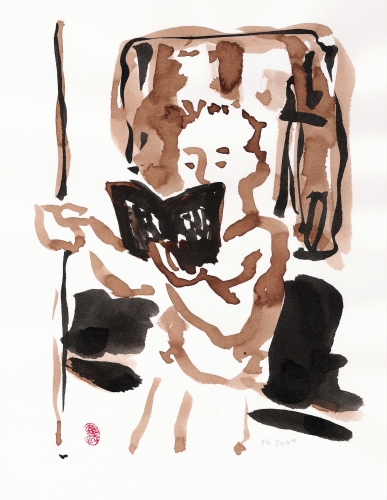 13. Can you read on the bus?
I could read on a roller coaster, so long as I wasn’t simultaneously being shot at.
13. Can you read on the bus?
I could read on a roller coaster, so long as I wasn’t simultaneously being shot at.
14. Favorite place to read? In bed.
15. What is your policy on book lending? I lend books to good friends. If they don’t return them, I stop lending to them.
16. Do you ever dog-ear books? Reflexively.
17. Do you ever write in the margins of your books? I’ve never written in or highlighted a book in my life. For some inexplicable reason, the very thought of doing so makes me cringe–it borders on a phobia. And yes, I realize that this is irreconcilable with my dog-earing habit. Go figure.
18. Not even with text books? No, never.
19. What is your favorite language to read in? Alas, I’m a monoglot.
20. What makes you love a book? I want it to tell me things I didn’t already know, and to do so in a way that I find irresistibly seductive.
21. What will inspire you to recommend a book? The fact that I liked it, so long as I think that the recommendee would be interested in its subject matter.
22. Favorite genre? I don’t have one. I suppose biography comes closest, but that’s mainly because I write biographies.
23. Genre you rarely read (but wish you did)? I’ve never been able to get into science fiction, and I suspect I’m missing something as a result.
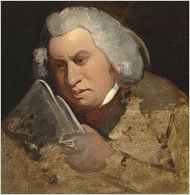 24. Favorite biography? W. Jackson Bate’s Samuel Johnson. Runner-up: David Cairns’ Berlioz.
24. Favorite biography? W. Jackson Bate’s Samuel Johnson. Runner-up: David Cairns’ Berlioz.
25. Have you ever read a self-help book? I read Dale Carnegie’s How to Stop Worrying and Start Living as a boy. (It was on the living-room bookshelf.) Nothing since then, so far as I can recall.
26. Favorite cookbook? I can’t cook, but I do love M.F.K. Fisher.
27. Most inspirational book you’ve read this year (fiction or non-fiction)? I don’t read “inspirational” books. Stories of heroism, broadly defined, inspire me, and on occasion certain books inspire me to try to write better.
28. Favorite reading snack? I rarely snack while reading, though I usually read when dining alone.
29. Name a case in which hype ruined your reading experience. It’s never happened. As Marlene Dietrich says in Touch of Evil, “What does it matter what you say about people?”
30. How often do you agree with critics about a book? I don’t keep track.
31. How do you feel about giving bad/negative reviews? A man’s gotta do what a man’s gotta do.
32. If you could read in a foreign language, which language would you choose? French. I very much wish I could read Proust in the original.
33. Most intimidating book you’ve ever read? I don’t find books intimidating (or much else, truth to tell).
34. Most intimidating book you’re too nervous to begin? See above.
35. Favorite poet? I don’t have a favorite poet. I like Yeats, Frost, Hardy, and Larkin, and lately I’ve gotten interested in Kay Ryan and Samuel Menashe.
36. How many books do you usually have checked out of the library at any given time? See #3.
37. How often have you returned a book to the library unread? Back in my student days, not infrequently.
38. Favorite fictional character? I’d have trouble choosing between Vicky Haven in Dawn Powell’s A Time to Be Born and Amanda Turck in James Gould Cozzens’ Guard of Honor. In addition, I confess–somewhat reluctantly–to identifying with Charles Gray in John P. Marquand’s Point of No Return.
39. Favorite fictional villain? Richard Stark’s Parker (if you can call him a villain–it’s a slippery proposition). Runners-up: Augustus Melmotte in Trollope’s The Way We Live Now and Widmerpool in Anthony Powell’s A Dance to the Music of Time.
40. Books I’m most likely to bring on vacation? Whatever I’m reading at the moment.
41. The longest I’ve gone without reading. I went without reading for a couple of days the last time I was in the hospital.
42. Name a book that you could/would not finish. Erle Stanley Gardner’s The Case of the Velvet Claws.
43. What distracts you easily when you’re reading? Nothing.
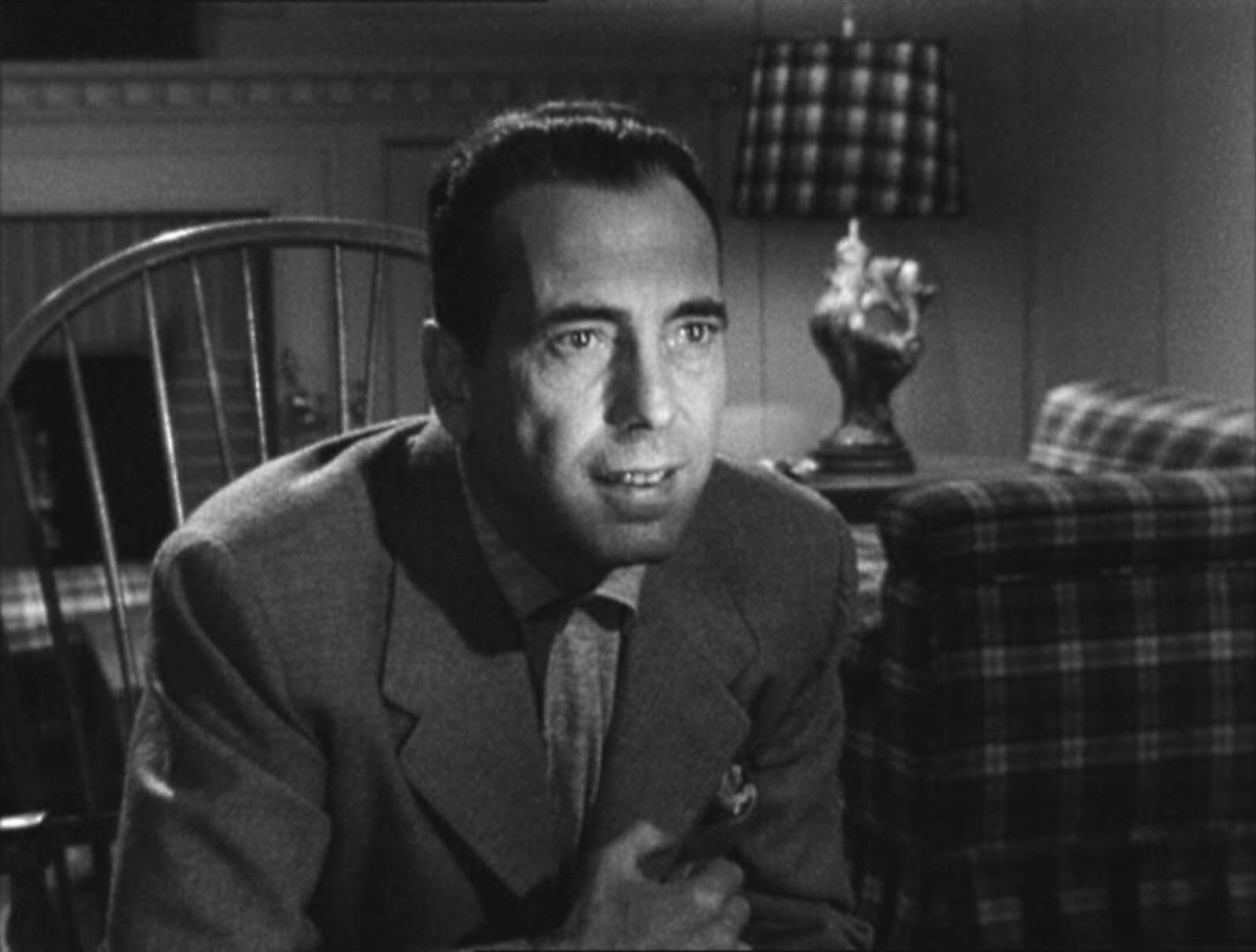 44. Favorite film adaptation of a novel?
Nicholas Ray’s In a Lonely Place. I suspect, however, that this question is meant to elicit films made from novels that are distinguished in their own right, in which case I’d single out Stephen Fry’s Bright Young Things and Paul Mazursky’s Enemies: A Love Story.
44. Favorite film adaptation of a novel?
Nicholas Ray’s In a Lonely Place. I suspect, however, that this question is meant to elicit films made from novels that are distinguished in their own right, in which case I’d single out Stephen Fry’s Bright Young Things and Paul Mazursky’s Enemies: A Love Story.
45. Most disappointing film adaptation? Otto Preminger’s Advise and Consent.
46. The most money I’ve ever spent in the bookstore at one time? Probably a couple of hundred dollars, but I rarely go to brick-and-mortar bookstores anymore.
47. How often do you skim a book before reading it? Almost never, unless I’m consulting it for purely professional reasons.
48. What would cause you to stop reading a book halfway through? If it bores me, I’ll stop after ten pages.
49. Do you like to keep your books organized? Yes, though I’m not excessively finicky about it.
50. Do you prefer to keep books or give them away once you’ve read them? Living as I do in a New York apartment, I dispose of superfluous books ruthlessly.
51. Are there any books you’ve been avoiding? No.
52. Name a book that made you angry. That is one long list, baby.
53. A book you didn’t expect to like but did? James Gould Cozzens’ By Love Possessed. Dwight Macdonald’s famous takedown fails altogether to convey its actual quality.
54. A book that you expected to like but didn’t? Colette’s The Pure and the Impure. I didn’t hate it, but I expected to like it a lot more than I did.
55. Favorite guilt-free, pleasure reading? Unless money is changing hands, I always read for pleasure, and I don’t do book-related guilt.
TT: Just because
Slim Gaillard and his trio sing “Dunkin’ Bagel” in 1946:
TT: Almanac
“The majority of people perform well in a crisis and when the spotlight is on them; it’s on the Sunday afternoons of this life, when nobody is looking, that the spirit falters.”
Alan Bennett, Writing Home
TT: The boys are back
In today’s Wall Street Journal I review the American premiere of The Habit of Art, Alan Bennett’s latest play, at Washington’s Studio Theatre. Here’s an excerpt.
* * *
Alan Bennett has a knack for writing big, complicated plays that are, like “The History Boys” and “The Madness of George III,” both challenging and entertaining. “The Habit of Art,” a fictional portrayal of the uneasy relationship between W.H. Auden and Benjamin Britten, fills the bill on all counts. Though the scale of the play (one set, two acts) is modest, “The Habit of Art” sprawls all over the place. But Mr. Bennett’s latest play is so excitingly written that you won’t find it hard to forgive its failings, and Washington’s Studio Theatre has given it a production so polished that it could open on Broadway as is.
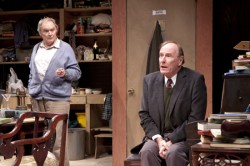 “The Habit of Art” is set at a rehearsal of “Caliban’s Day,” an imaginary docudrama about Auden, Britten and Humphrey Carpenter, who wrote biographies of both men. In the play-within-the-play, the fictional Carpenter (Cameron Folmar) pays a visit to the fictional Auden (Ted van Griethuysen) to interview him about the fictional Britten (Paxton Whitehead). Then Britten pays a visit to Auden, whom he hasn’t seen in person for 20 years, to ask the poet’s advice about the operatic version of “Death in Venice” on which he is working. Their awkward reunion is interrupted by the arrival of a young male prostitute (Randy Harrison) who has a date with Auden and in whom Britten takes a furtive interest.
“The Habit of Art” is set at a rehearsal of “Caliban’s Day,” an imaginary docudrama about Auden, Britten and Humphrey Carpenter, who wrote biographies of both men. In the play-within-the-play, the fictional Carpenter (Cameron Folmar) pays a visit to the fictional Auden (Ted van Griethuysen) to interview him about the fictional Britten (Paxton Whitehead). Then Britten pays a visit to Auden, whom he hasn’t seen in person for 20 years, to ask the poet’s advice about the operatic version of “Death in Venice” on which he is working. Their awkward reunion is interrupted by the arrival of a young male prostitute (Randy Harrison) who has a date with Auden and in whom Britten takes a furtive interest.
Around this more than sufficiently intriguing situation, Mr. Bennett has wrapped a backstage comedy about the process of rehearsing “Caliban’s Day” for production at London’s National Theatre. In addition to the cast of “Caliban’s Day,” we meet the vain, neurotic playwright (Wynn Harmon), the long-suffering stage manager (Margaret Daly) and various other familiar but knowingly drawn theatrical types. Imagine “Noises Off” rewritten by Tom Stoppard and you’ll get some notion of the havoc arising from the collision of play and play-within-a-play….
The rehearsal-room sequences of “The Habit of Art” are totally convincing, so much so that the play seems in the end to be more about theater itself than about Auden and Britten. The problem is that the contrast between Auden’s self-acceptance and Britten’s “occluded sexuality” (in Auden’s phrase) is the emotional engine that drives “The Habit of Art,” and Mr. Bennett has not made it dramatically compelling. Yet even when it falters, “The Habit of Art” holds your attention, and David Muse’s staging is so clearly articulated and full of crisp comic energy that you’ll have no difficulty picking your way through the thickets of Mr. Bennett’s labyrinthine plot….
* * *
Read the whole thing here.
TT: Almanac
“Argument is generally waste of time and trouble. It is better to present one’s opinion and leave it to stick or no as it may happen. If sound, it will probably in the end stick, and the sticking is the main thing.”
Samuel Butler, The Note-Books of Samuel Butler
TT: So you want to see a show?
Here’s my list of recommended Broadway, off-Broadway, and out-of-town shows, updated weekly. In all cases, I gave these shows favorable reviews (if sometimes qualifiedly so) in The Wall Street Journal when they opened. For more information, click on the title.
BROADWAY:
• Anything Goes (musical, G/PG-13, mildly adult subject matter that will be unintelligible to children, closes Jan. 8, most performances sold out last week, reviewed here)
• Follies (musical, PG-13, adult subject matter, closes Jan. 1, most performances sold out last week, reviewed here)
• How to Succeed in Business Without Really Trying (musical, G/PG-13, perfectly fine for children whose parents aren’t actively prudish, reviewed here)
OFF BROADWAY:
• Avenue Q (musical, R, adult subject matter and one show-stopping scene of puppet-on-puppet sex, reviewed here)
• The Fantasticks (musical, G, suitable for children capable of enjoying a love story, reviewed here)
• Million Dollar Quartet (jukebox musical, G, off-Broadway remounting of Broadway production, original run reviewed here)
IN ASHLAND, OREGON:
• August: Osage County (drama, PG-13/R, closes Nov. 5, reviewed here)
• Julius Caesar (Shakespeare, PG-13, closes Nov. 6, reviewed here)
• Measure for Measure (Shakespeare, PG-13, closes Nov. 6, reviewed here)
CLOSING SOON IN ASHLAND, OREGON:
• The Pirates of Penzance (operetta, G, suitable for children, closes Oct. 8, reviewed here)
CLOSING SOON IN HARTFORD, CONNECTICUT:
• The Crucible (drama, PG-13, partial nudity, extended through Oct. 6, reviewed here)
CLOSING SOON IN WASHINGTON, D.C.:
• Oklahoma! (musical, G, remounting of 2010 production, suitable for children, closes Oct. 2, original run reviewed here)
CLOSING NEXT WEEK IN SPRING GREEN, WISCONSIN:
• The Tempest (Shakespeare, G/PG-13, closes Sept. 30, reviewed here)
CLOSING SUNDAY IN SPRING GREEN, WISCONSIN:
• The Cure at Troy (Greek tragedy, G, far too intense for children, reviewed here)
